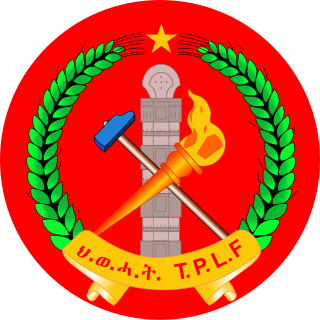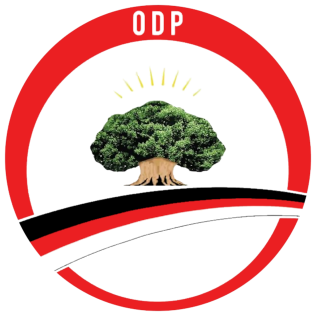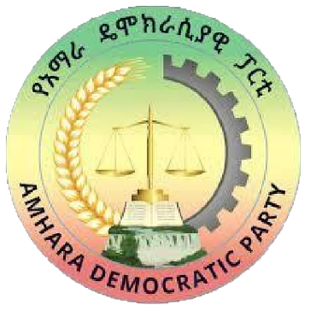
The politics of Ethiopia are the activities associated with the governance of Ethiopia. The government is structured as a federal parliamentary republic with both a President and Prime Minister. The legislature is multicameral, with a house of representatives and a council. The term politics of Ethiopia mainly relates to the political activities in Ethiopia after the late 20th century when democratization took place in the nation. The current political structure of Ethiopia was formed after the Tigrayan People's Liberation Front (TPLF) overthrew dictator President Mengistu Haile Mariam in 1991. A general election was held in June 1994 and Ethiopia has maintained a multiparty political environment till today.

The Cameroon People's Democratic Movement is the ruling political party in Cameroon. Previously known as the Cameroonian National Union, which had dominated Cameroon politics since independence in the 1960s, it was renamed in 1985. The national president of the CPDM is Paul Biya, the president of Cameroon, while the secretary-general of the party Central Committee is Jean Nkuete.

The Ethiopian People's Revolutionary Democratic Front was an ethnic federalist political coalition in Ethiopia that existed from 1988 to 2019. It consisted of four political parties: Tigray People's Liberation Front (TPLF), Amhara Democratic Party (ADP), Oromo Democratic Party (ODP) and Southern Ethiopian People's Democratic Movement (SEPDM). After leading the overthrow of the People's Democratic Republic of Ethiopia, it dominated Ethiopian politics from 1991 to 2019. In November 2019, the EPRDF was dissolved, and Prime Minister and EPDRF chairman Abiy Ahmed merged three of the constituent parties into his new Prosperity Party, which was officially founded on 1 December 2019.

The Tigray People's Liberation Front, also called the Tigrayan People's Liberation Front, is a left-wing ethnic nationalist, paramilitary group, and the former ruling party of Ethiopia. It was classified as a terrorist organization by the Ethiopian government from May 2021 until its removal from the list in March 2023. In older texts and Amharic publications, it is known as Woyane or Wayane.

Under the current constitution, Ethiopia conducts local, regional, and federal elections. At the federal level, Ethiopia elects a legislature. The Federal Parliamentary Assembly has two chambers: the House of People's Representatives with not more than 550 members as per the constitution but actually nearly 547 members, elected for five-year terms in single-seat constituencies; and the Council of the Federation with 117 members, one each from the 22 minority nationalities, and one from each professional sector of its remaining nationalities, designated by the regional councils, which may elect them themselves or through popular elections.

General elections were held in Ethiopia on 15 May 2005, for seats in the House of Peoples' Representatives and four regional government councils. Under pressure from the international community, Prime Minister Meles Zenawi promised that this election would be proof that more democracy would come in this multi-ethnic nation; international elections observers from the European Union (EU) and the U.S.-based Carter Center were present to observe the results. This election succeeded in attracting about 90% of the registered voters to the polls. A government ban on protests was imposed throughout the election period.

The United Ethiopian Democratic Forces was a coalition of several political parties in Ethiopia which combined to compete for seats in the Ethiopian general elections held on 15 May 2005.

The Oromo Democratic Party, formerly called the Oromo People's Democratic Organization, was a political party in Ethiopia, and part of the alliance with the Amhara National Democratic Movement, the South Ethiopian Peoples' Democratic Front and the Tigrayan Peoples' Liberation Front that formed the Ethiopian People's Revolutionary Democratic Front (EPRDF). In the August 2005 Regional assembly elections, the party won 387 out of 537 seats in the Oromia, and 14 out of 36 seats in the Harari Region.

The Amhara Democratic Party (ADP), originally known as Amhara National Democratic Movement (ANDM), was a political party in Ethiopia. The party was one of four members of the Ethiopian People's Revolutionary Democratic Front (EPRDF) that ruled Ethiopia at the time. In 2012, the party chairman was Demeke Mekonnen, who replaced Addisu Legesse in 2010. In November 2019, prime minister Abiy Ahmed, holding the role of EPRDF chair, unified the constituent parties of the coalition into a new party called Prosperity Party.

The Southern Ethiopian People's Democratic Movement (SEPDM) was a political party in Ethiopia. At the last legislative elections, 15 May 2005, the party was part of the Ethiopian People's Revolutionary Democratic Front, that won 327 out of 527 seats in the Council of People's Representatives.

The Afar National Democratic Party was a political party in Ethiopia. At the legislative elections held on 15 May 2005, the party won 8 seats, all from the Afar Region. The current Minister of Social Affairs and the Deputy Chairman of Pastoralist Affairs are members of the party.

The Gambela Peoples’ Democratic Movement, also known as the Gambela People’s Democratic Movement or Gambella Peoples’ Unity Democratic Movement, was a political party in the Gambela Region of Ethiopia. It was the regional ally of the ruling EPRDF coalition.

The Sheko and Mezenger People's Democratic Unity Organization is a political party in Ethiopia. At the last legislative elections, 15 May 2005, the party elected Kassahun Jarka Ziyatu to represent a district in the Bench Maji Zone of the Southern Nations, Nationalities, and Peoples Region (SNNPR).

General elections were held in Ethiopia on 14 May and 31 August 2000 for seats in the House of Peoples' Representatives and several regional government councils. Although several opposition parties boycotted the election, 17 parties including the All-Amhara People's Organization, the Southern Ethiopia Peoples' Democratic Coalition (SEPDC), and the Oromo National Congress did participate.

The Constitution of the Federal Democratic Republic of Ethiopia, also known as the 1995 Constitution of Ethiopia, is the supreme law of Ethiopia. The constitution came into force on 21 August 1995 after it was drawn up by the Constituent Assembly that was elected in June 1994. It was adopted by the Transitional Government of Ethiopia on 8 December 1994 and came into force following the general election held in May–June 1995.

Elections for a Constituent Assembly were held in Ethiopia on 5 June 1994 in order to form a body to draw up a new constitution. They were the first elections after the overthrow of the Mengistu regime at the end of the Ethiopian Civil War in 1991, and the first ever multi-party elections in the country; previous elections had either been non-partisan or one-party. The results saw the Ethiopian People's Revolutionary Democratic Front and its allies win 463 of the 544 seats. Voter turnout was 87.5%.

The Transitional Government of Ethiopia (TGE) was an era established immediately after the Ethiopian People's Revolutionary Democratic Front (EPRDF) seized power from the Marxist-Leninist People's Democratic Republic of Ethiopia (PDRE) in 1991. During the transitional period, Meles Zenawi served as the president of the TGE while Tamrat Layne was prime minister. Among other major shifts in the country's political institutions, it was under the authority of the TGE that the realignment of provincial boundaries on the basis of ethnolinguistic identity occurred. The TGE was in power until 1995, when it transitioned into the reconstituted Federal Democratic Republic of Ethiopia that remains today.

The 2021 Ethiopian general election to elect members of the House of Peoples' Representatives was held on 21 June 2021 and 30 September 2021. Regional elections were also held on those dates.
The 1995 Ethiopian Federal Constitution formalizes an ethnic federalism law aimed at undermining long-standing ethnic imperial rule, reducing ethnic tensions, promoting regional autonomy, and upholding unqualified rights to self-determination and secession in a state with more than 80 different ethnic groups. But the constitution is divisive, both among Ethiopian nationalists who believe it undermines centralized authority and fuels interethnic conflict, and among ethnic federalists who fear that the development of its vague components could lead to authoritarian centralization or even the maintenance of minority ethnic hegemony. Parliamentary elections since 1995 have taken place every five years since enactment. All but one of these have resulted in government by members of the Ethiopian People's Revolutionary Democratic Front (EPRDF) political coalition, under three prime ministers. The EPRDF was under the effective control of the Tigray People's Liberation Front (TPLF), which represents a small ethnic minority. In 2019 the EPRDF, under Abiy, was dissolved and he inaugurated the pan-ethnic Prosperity Party which won the 2021 Ethiopian Election, returning him as prime minister. But both political entities were different kinds of responses to the ongoing tension between constitutional ethnic federalism and the Ethiopian state's authority. Over the same period, and all administrations, a range of major conflicts with ethnic roots have occurred or continued, and the press and availability of information have been controlled. There has also been dramatic economic growth and liberalization, which has itself been attributed to, and used to justify, authoritarian state policy.










